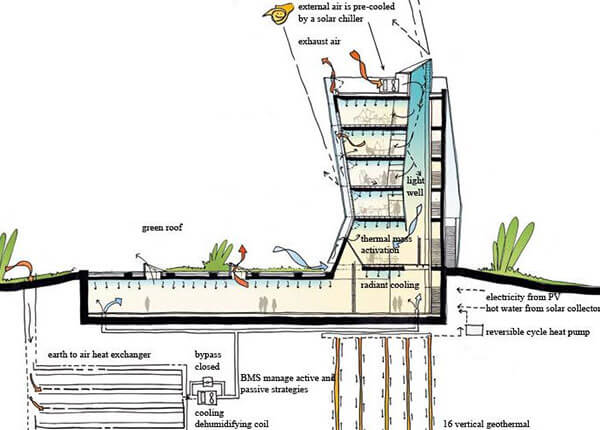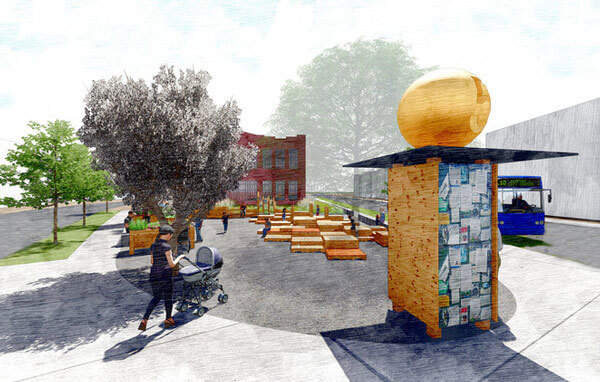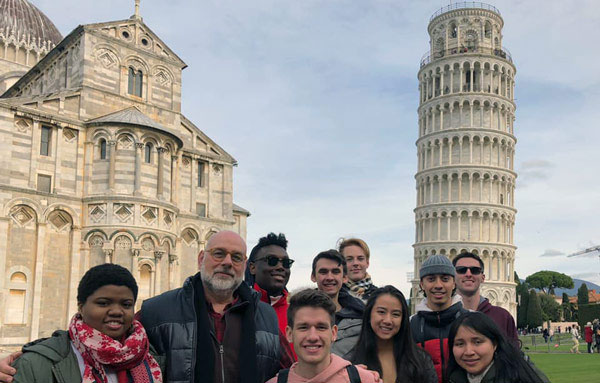The focus of the program is the design studio in which the technical, structural, and liberal arts courses are integrated through the creative process in the design of progressively more complex architectural projects.
Questions?
Contact Program Director James Fuller for more information.
About the Major

A strong component of liberal arts, with particular emphasis on communications skills, as well as multiple electives in the later years, ensures that students who pursue this program will have a challenging architectural education that prepares you for your career path. You will gain a broad understanding of the knowledge and skills necessary for entry into architecture firms or the building industries or to pursue advanced degrees in architecture and related disciplines.
About the Minor
A minor in architecture is available for students in programs other than AD+T who have interests and abilities in architectural design. Students must announce their intention to minor in architecture any time prior to the end of their junior year. However, due to the sequence of courses and prerequisites students should begin the minor in the fall of junior year. Students interested in this minor must be accepted by the Department of Architecture and complete the following courses.
Program Information
For more information, and to see a complete list of degree requirements, visit the Course Catalog.
Core Classes
- ADT 112 | Intro to the Built Environment
- ADT 123 | Architectural Design I
- ADT 155 | Ancient through Renaissance Architecture
- ADT 156 | Architecture Since the Renaissance
- ADT 233 | Architectural Design II
- ADT 244 | Architectural Design III
- ADT 350 | Intro to Architectural Theory
- ADT 352 | Architectural Design IV
- ADT 358 | Architectural Computer Modeling and Rendering
- ADT 371 | Architectural Design V
- ADT 489 | Senior Thesis/Capstone Project
Electives
The following is a partial list of electives you are able to take:
- ADT 343 | Principles of Landscape Architecture
- ADT 353 | Site Planning and Development
- ADT 356 | Intro to Chinese and Japanese Architecture
- ADT 359 | Advanced Construction Documents
- ADT 362 | Advanced Computer Applications in Architecture
- ADT 366 | Sustainable Design
- ADT 373 | Interior Architecture
- ADT 384 | Issues in Preservations
- ADT 471 | Independent Study
- ADT 473 | Architectural Rendering and Portfolio Development – Hand Drawing
- ADT 473 | Architectural Rendering and Portfolio Development – Digital Drawing
- ADT 481 | Professional Practice
Concentrations
Students enrolled in the architectural design + technology program can choose from three concentrations to complement their program, including:

For students interested in pursuing a focus in construction processes, scheduling, and budgeting. Students will learn specific management and construction techniques that will provide a graduating student with the ability to enter the construction management field with a strong architectural design and structures background.

The AD+T curriculum stresses the integration of environmental sustainability principles and practices in all studio projects. Many students seek to expand their depth of understanding of these principles and practices to include more advanced integrative practices and research.
For students with career goals that focus on professional practice and the management of an architecture firm. These students see themselves as architects and business leaders.
5-year Bachelors + Masters
The University of Hartford offers students an opportunity to complete both a BS in Architectural Design + Technology and a Master of Architecture in five years. The MArch Track 1 is available for qualified UHart undergraduate AD+T students who begin taking graduate courses in senior year, then complete a 12-month (3-semester) MArch track immediately following their Bachelors program. This opportunity saves on the total cost of education and allows students to enter the full-time workforce one year earlier than a traditional 4+2 program sequence. Learn more.
Career Outlook

Our architectural design + technology program is designed to prepare you for career success.
Our graduates go on to work at companies like Amenta Emma Architects, Crosskey Architects, Disney Imagineers, FIP Construction, JCJ Architecture, S/L/A/M Collaborative, Tai Soo Kim Partners Architects, Tecton Architects, and Turner Construction.Resources for First-Year Students
Members of the Department of Architecture are committed to creating and preserving a learning culture that is conducive to the growth of the relationships needed to help students succeed in their goals and to fulfill the mission of the department.
Architecture tool kits for entering first-year students will be available at the start of the fall semester at Jerry's Artarama, 1109 New Britain Ave, West Hartford, CT 06110, 860.232.0073. The College will not be accepting checks for purchase. Jerry's Artarama usually provides transportation to their West Hartford location at the start of the semester.
The Department of Architecture suggests incoming first-year architecture students consider these computer recommendations, including make, model, and software.
Joshua Perron
Architectural Design + Technology, 2026
His top moving tip is to “put all your clothes on hangers and put it all in a bag—you can go and hang it up and come back down quickly.”
Study Abroad Opportunities

The Department of Architecture offers unique study abroad opportunities for its students, from first year through graduate. Students have traveled to areas like Cuba, Barcelona, Peru, Germany, and Italy. Through programs built with universities, you can explore different architectural monuments around the world and study in areas you have dreamed of.
Accreditation
The architectural design + technology program is accredited by the Engineering Technology Accreditation Commission of ABET, www.abet.org.
Within a few years of graduation, architectural design + technology graduates will be expected to attain:
PEO-1 Position of responsibility and integral participation with an architecture or engineering firm, construction management, construction company, facilities management, or a development company.
PEO-2 Actively earning internship qualifications to meet the IDP requirements for taking the Architectural Registration Exam or other professional licensing/registration;
PEO-3 Active role in professional organizations at the local, state or national level and active service in the broader community.
PEO-4 Be prepared to enter professional degree programs in architecture and other disciplines.
ETAC General Criteria Student Outcomes:
- An ability to apply knowledge, techniques, skills, and modern tools of mathematics, science, engineering, or technology to solve broadly-defined engineering problems appropriate to the discipline;
- An ability to design systems, components , or processes meeting specified needs for broadly-defined engineering problems appropriate to the discipline;
- An ability to apply written, oral and graphical communication in broadly-defined technical and non-technical environments; and an ability to identify and use appropriate technical literature.
- An ability to conduct standard tests and measurements, and experiments and to analyze and interpret the results to improve processes;
- An ability to function effectively as a member as well as a leader on technical teams;
Program Specific Criteria Student Outcomes:
PSC-a. Employment of architectural theory and design in a design environment;
PSC-b. Utilization of instruments, methods, software, and techniques that are appropriate to produce A/E documents and presentations;
PSC-c. Utilization of measuring methods that are appropriate for field, office, or laboratory;
PSC-d Application of fundamental computational methods and elementary analytical techniques in sub-disciplines related to architecture;
PSC-e Creation, utilization, and presentation of documents related to design and construction;
PSC-f. Performance of economic analysis and cost estimates related to design and construction of building systems;
PSC-g Selection of appropriate materials and practices for building construction;
PSC-h Application of principles of construction law and ethics in architectural practice, and;
PSC-i Performance of standard analysis and design in at least one recognized technical specialty within architecture that is appropriate to the goals of the program.

Architecture Faculty
Civil, Environmental, and Biomedical Engineering
